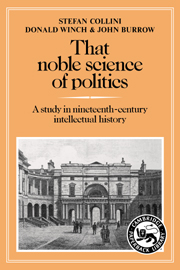Book contents
- Frontmatter
- Contents
- Preface
- PROLOGUE: The governing science: things political and the intellectual historian
- I The system of the North: Dugald Stewart and his pupils
- II Higher maxims: happiness versus wealth in Malthus and Ricardo
- III The cause of good government: Philosophic Whigs versus Philosophic Radicals
- IV The tendencies of things: John Stuart Mill and the philosophic method
- V Sense and circumstances: Bagehot and the nature of political understanding
- VI All that glitters: political science and the lessons of history
- VII The clue to the maze: the appeal of the Comparative Method
- VIII Particular polities: political economy and the historical method
- IX The ordinary experience of civilised life: Sidgwick and the method of reflective analysis
- X A separate science: polity and society in Marshall's economics
- XI A place in the syllabus: political science at Cambridge
- EPILOGUE: A nebulous province: the science of politics in the early twentieth century
- Index
X - A separate science: polity and society in Marshall's economics
Published online by Cambridge University Press: 17 September 2009
- Frontmatter
- Contents
- Preface
- PROLOGUE: The governing science: things political and the intellectual historian
- I The system of the North: Dugald Stewart and his pupils
- II Higher maxims: happiness versus wealth in Malthus and Ricardo
- III The cause of good government: Philosophic Whigs versus Philosophic Radicals
- IV The tendencies of things: John Stuart Mill and the philosophic method
- V Sense and circumstances: Bagehot and the nature of political understanding
- VI All that glitters: political science and the lessons of history
- VII The clue to the maze: the appeal of the Comparative Method
- VIII Particular polities: political economy and the historical method
- IX The ordinary experience of civilised life: Sidgwick and the method of reflective analysis
- X A separate science: polity and society in Marshall's economics
- XI A place in the syllabus: political science at Cambridge
- EPILOGUE: A nebulous province: the science of politics in the early twentieth century
- Index
Summary
Marshall was the first great economist pur sang that there ever was; the first who devoted his life to building up the subject as a separate science, standing on its own foundations with as high standards of scientific accuracy as the physical or biological sciences. It was Marshall who finally saw to it that ‘never again will Mrs Trimmer, a Mrs Marcet, or a Miss Martineau earn a goodly reputation by throwing economic principles into the form of a catechism or of simple tales, by aid of which any intelligent governess might make clear to the children nestling around her where lies economic truth’. But – much more than this – after his time Economics could never be again one of a number of subjects which a Moral Philosopher would take in his stride, one Moral Science out of several, as Mill, Jevons, and Sidgwick took it. He was the first to take up this professional scientific attitude to the subject, as something above and outside current controversy, as far from politics as physiology is from the general practitioner.
john maynard keynes, 'Alfred Marshall 1842–1924’, Memorials of Alfred Marshall (1925)any exploration of the various nineteenth-century projects for gaining access to systematic knowledge of ‘things political’ would be bound to encounter the privileged position accorded to political economy, and several of these essays have already, in their different ways, touched upon this topic.
- Type
- Chapter
- Information
- That Noble Science of PoliticsA Study in Nineteenth-Century Intellectual History, pp. 309 - 338Publisher: Cambridge University PressPrint publication year: 1983
- 1
- Cited by



